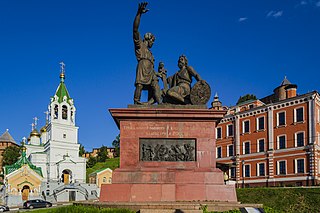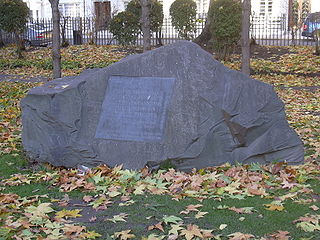
Yoweri Kaguta Museveni is a Ugandan politician and retired military officer who is the 9th and current President of Uganda since 26 January 1986. Museveni spearheaded rebellions with the aid of Tito Okello and Bale Travor that toppled Ugandan presidents Milton Obote and Idi Amin before capturing power in 1986.

Alhaji Ahmad Tejan Kabbah was a Sierra Leonean politician who served twice as the 3rd President of Sierra Leone, from 1996 to 1997 and again from 1998 to 2007. An economist and attorney by profession, Kabbah spent many years working for the United Nations Development Programme. He retired from the United Nations and returned to Sierra Leone in 1992.

The African Great Lakes are a series of lakes constituting the part of the Rift Valley lakes in and around the East African Rift. They include Lake Victoria, the second-largest fresh water lake in the world by area, Lake Tanganyika, the world's second-largest freshwater lake by volume and depth, and Lake Malawi, the world's eighth-largest fresh water lake by area. Collectively, they contain 31,000 km3 (7,400 cu mi) of water, which is more than either Lake Baikal or the North American Great Lakes. This total constitutes about 25% of the planet's unfrozen surface fresh water. The large rift lakes of Africa are the ancient home of great biodiversity, and 10% of the world's fish species live in this region.
The Oropom were the aboriginal inhabitants of much of Karamoja in Uganda, Mt. Elgon area and West Pokot, Trans Nzoia and Turkana regions in Kenya. Their descendants were largely assimilated into various communities present in their former territories, including the Iteso, Karamojong, Pokot, Turkana and Bukusu. They are or were found in scattered pockets between the Turkwel River, Chemorongit Mountains and Mt. Elgon. One report indicates that they formerly spoke the unclassified Oropom language.
The Nairobi Agreement was a peace deal between the Ugandan government of Tito Okello and the National Resistance Army (NRA) rebel group led by Yoweri Museveni. The accords were signed in Nairobi, Kenya in December 1985.
The Lomé Peace Agreement was a peace agreement signed on 7 July 1999 between the warring parties in the civil war that gripped Sierra Leone for almost a decade. President Ahmad Tejan Kabbah signed with the Revolutionary United Front (RUF) leader, Foday Sankoh and granted Sankoh a position in the transitional government as well as amnesty for him and all combatants. The accord is named for Lomé, the capital of Togo, where the negotiations took place and the agreement was signed.

Ateker, or ŋaTekerin, is a common name for the closely related Lango people, Jie, Karamojong, Turkana, Toposa, Nyangatom and Teso peoples and their languages. These ethnic groups inhabit an area across Uganda and Kenya. Itung'a and Teso have been used among ethnographers, while the term Teso-Turkana is sometimes used for the languages, which are of Eastern Nilotic stock. Ateker means 'clan' or 'tribe' in the Teso language. In the Lango language, the word for clan is atekere.
Heroes' Day or National Heroes' Day may refer to a number of commemorations of national heroes in different countries and territories. It is often held on the birthday of a national hero or heroine, or the anniversary of their great deeds that made them heroes.

The Toposa are an ethnic group in South Sudan, living in the Greater Kapoeta region of the erstwhile Eastern Equatoria state. They have traditionally lived by herding cattle, sheep and goats, and in the past were involved in the ivory trade. They have a tradition of constant low-level warfare, usually cattle raids, against their neighbors.

Unity Day, also called the Day of People's Unity or National Unity Day, is a national holiday in Russia held on 4 November [O.S. 22 October]. It commemorates the popular uprising which expelled Polish–Lithuanian occupation forces from Moscow by a militia from Nizhny Novgorod in November 1612, and more generally the end of the Time of Troubles and turning point of the Polish-Russian War (1605–1618).
The Treaty of Varkiza was signed in Varkiza on February 12, 1945 between the Greek Minister of Foreign Affairs and the Secretary of the Communist Party of Greece (KKE) for EAM-ELAS, following the latter's defeat during the Dekemvriana clashes. One of the aspects of the accord called for a plebiscite to be held within the year in order to resolve any problems with the Greek Constitution. This plebiscite would help establish elections and thus create a constituent assembly that would draft a new organic law. In another aspect of the treaty, both signatories agreed that the Allies send overseers in order to verify the validity of the elections. The accord also promised that members of the EAM-ELAS would be permitted to participate in political activities if they surrendered their weapons. Moreover, all civil and political liberties would be guaranteed along with the undertaking by the Greek government towards establishing a nonpolitical national army.

The Comprehensive Peace Agreement, also known as the Naivasha Agreement, was an accord signed on January 9, 2005, by the Sudan People's Liberation Movement (SPLM) and the Government of Sudan. The CPA was meant to end the Second Sudanese Civil War, develop democratic governance countrywide, and share oil revenues. It also set a timetable for a Southern Sudanese independence referendum.
Memorialization generally refers to the process of preserving memories of people or events. It can be a form of address or petition, or a ceremony of remembrance or commemoration.
The Dodoth are an ethnic group in north eastern Uganda. They belong to the Karamojong Cluster, which also includes the Karamojong and Jie people. Their language is a dialect of the Karamojong language.

The First World War centenary was the centenary of the First World War, which began on 28 July 2014 with a series of commemorations of the outbreak of the war organised across the continent of Europe, and ended on 11 November 2018 with global commemorations of the centenary of the 1918 Armistice.
Josphat Nanok is a Kenyan politician who served as the governor of Turkana County from 2013 to 2022.

The Conscientious Objectors' Commemorative Stone is on the north side of Tavistock Square, Bloomsbury, in the London Borough of Camden.

The Tobong'u Lore, known in English as the Lake Turkana Cultural Festival, is a celebration of indigenous culture held every spring in Turkana, northern Kenya. The festival is hosted by a number of indigenous communities adjacent to the lake, and is meant to promote peace, cultural exchange, and tourism. The El Molo people host the festival in Loiyangalani every June, and the Turkana people host the festival in Lodwar in April. The Tobong'u Lore is considered among the largest of cultural festivals in Kenya, and has become a venue for appearances by prominent Kenyan politicians.

Kibunjia Nyagah Mzalendo is a Kenyan archeologist. He formerly served as the Director General of the National Museums of Kenya (NMK), a multi-disciplinary state corporation. He was appointed as the first chairman of the National Cohesion and Integration Commission (NCIC), a government agency intended to address and reduce inter-ethnic conflicts. In this role, he chaired the Nakuru Peace Accord between the Agikuyu and the Kalenjin communities. He was the first Kenyan to hold a doctorate in Early Stone Age Archaeology.










